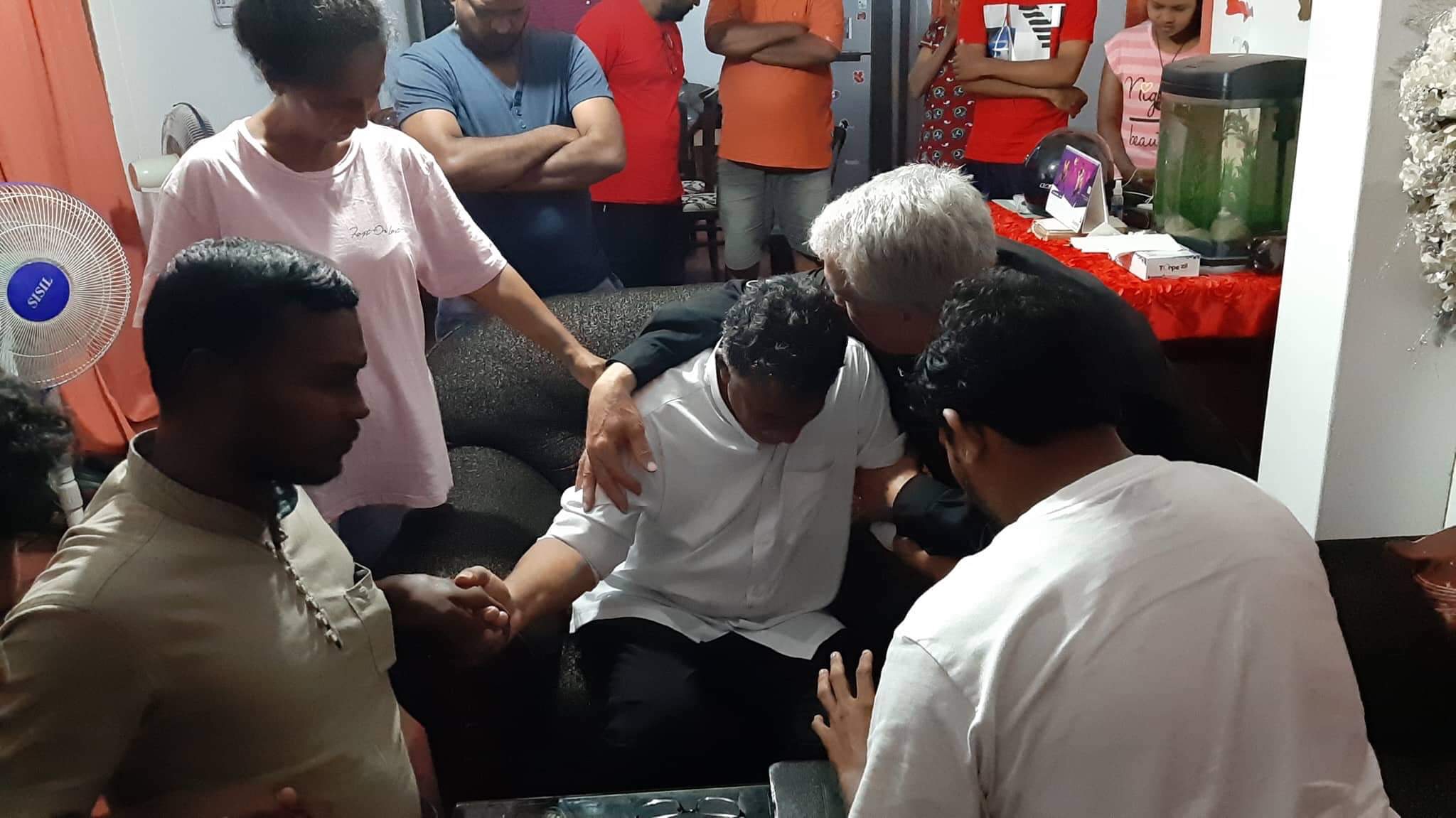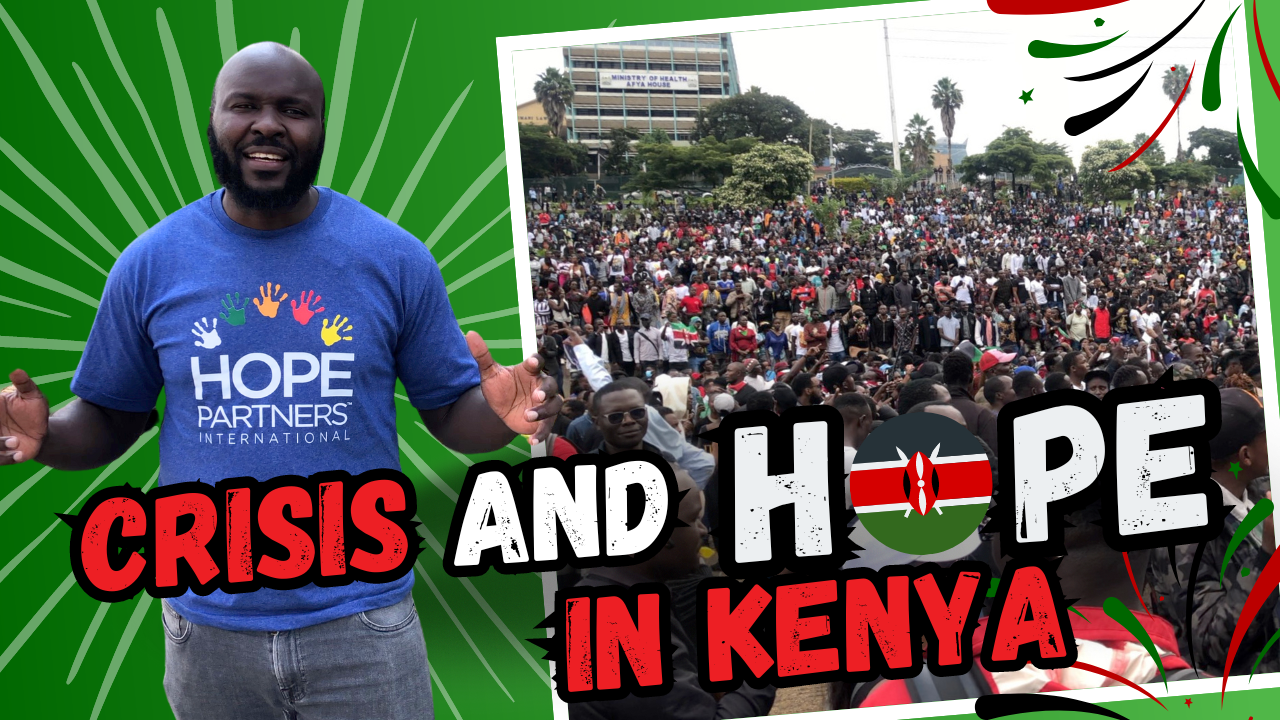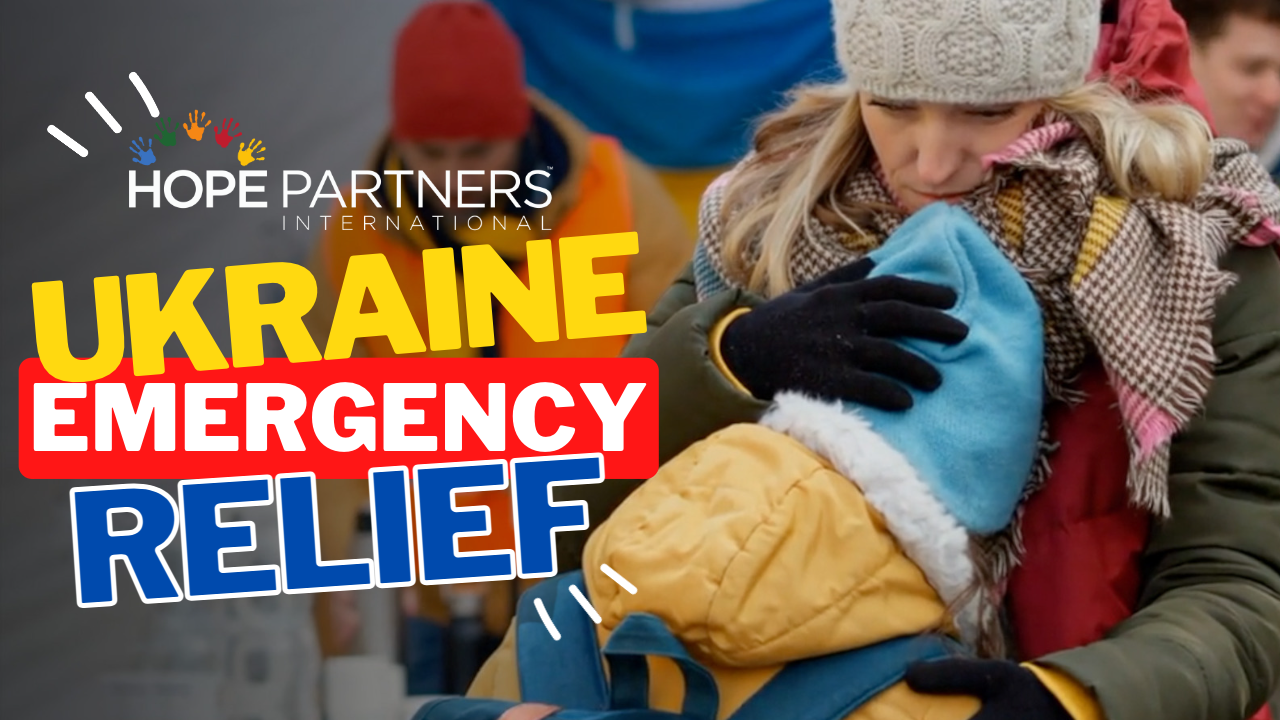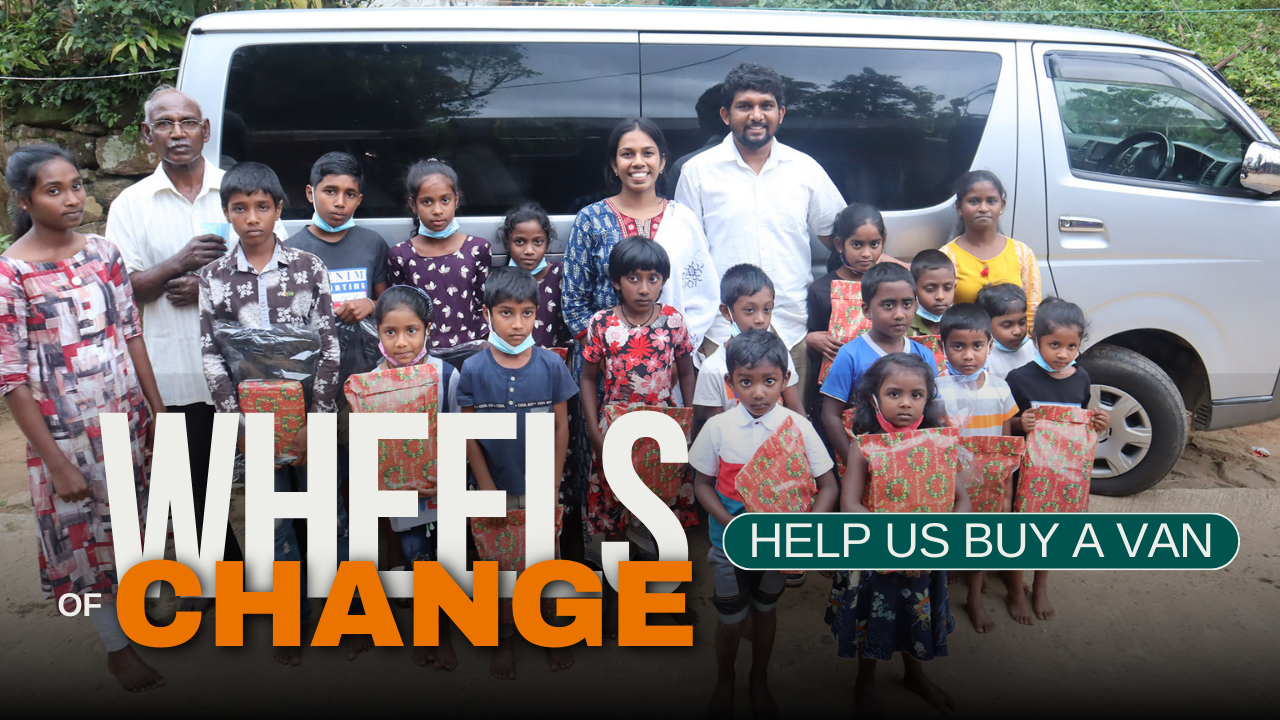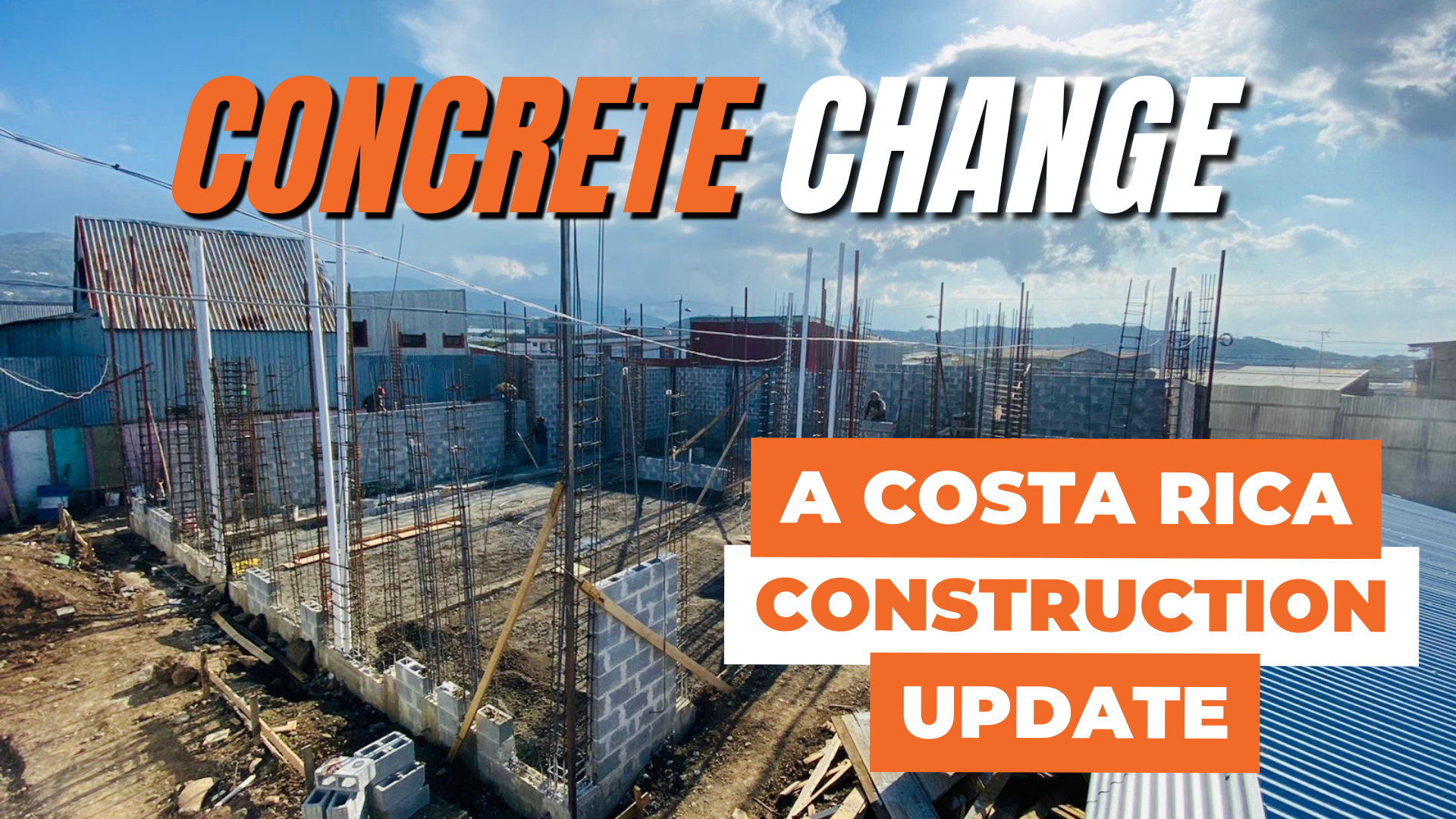A Special Report from Kirk Nowery –
On the morning of April 21—Easter Sunday 2019—Islamic terrorists attacked churches and commercial sites in the island nation of Sri Lanka. In a series of coordinated suicide bombings, over 250 people were killed and hundreds more were injured. Churches were bombed in the capital city of Colombo, in Negombo, and in Batticaloa on the eastern coast.
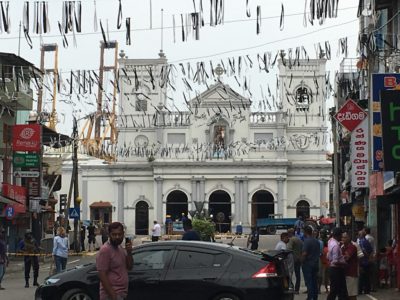
Mourning strips flutter above a street in downtown Colombo.
I was in New Delhi when we first heard the news reports. My wife, Violeta, was just preparing to depart India to visit her cancer-stricken father in Romania. As we watched the news she said, “Isn’t there something we can do for those children? There are a lot of suffering children there. Sri Lanka is just a three-hour flight from here.” Her question set in motion an unforgettable quest. Go with me as I describe what transpires, step by step…
I first contact Hope Partners’ board chairman, Andy Stimer, and ask his advice. He encourages me to go to Sri Lanka on behalf of our organization, but to contact key ministry partners, share the vision with them, and encourage their support and prayer before I leave. I get to work at once. I call Joseph Thomas, director of our Hope Center in Ajmer, and ask him to join me on the trip. He eagerly says yes and leaves Ajmer to meet me in Delhi. The next day Joseph and I go to the Sri Lanka embassy and are immediately granted visas. Our flights are booked and we prepare to depart the next day.
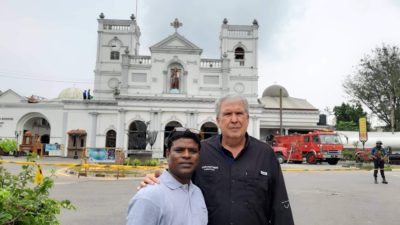
Kirk and Joseph in front of St. Anthony’s Church, site of the first bombing.
Answers start coming in to the emails I had sent to a handful of key church leaders and ministry partners. I had told them that we have no idea what God has in store for us, but we’d love to have their partnership in this venture. Several respond positively, committing their prayers and nearly $20,000 in financial support.
On Thursday, April 24, just three days after the events that rocked Sri Lanka, we are on our way.
As we enter the airport in Colombo the scene is chaotic and noisy. Countless people are clamoring to leave the country. Joseph and I are absolutely alone as we enter passport control and are literally waved past the guards. Where will God lead us in this traumatized nation? We pray for His guidance and blessing, and set out for a nearby hotel. Security is tight everywhere. Even entering the hotel, we go through a multi-step process via several guard posts. Once inside the very large building we see no other guests (and it remains that way for our entire stay).
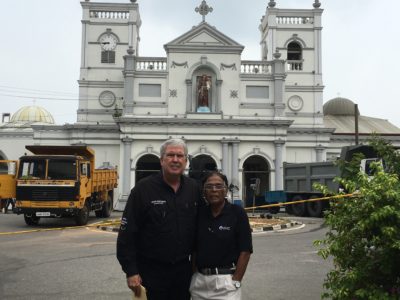
Kirk with Dr. Thevabalasingham on a main streets in Colombo.
God begins to guide our steps. Dr. Sam Thevabalasingham, a highly-respected man who directs a Christian ministry in Sri Lanka, phones me at the hotel. He tells me that Andy Stimer has sent him an email to let him know we will be in the country. He proposes to come and meet with us. After our meeting, he accompanies us to one of the churches that had been attacked, St. Anthony’s Church in Colombo. The military presence is everywhere.
As we approach St. Anthony’s it is clear that we won’t be able to get very near. No closer than 50 yards. The armed forces have sealed off the immediate area while the clean-up effort continues. At a divinely-timed moment we encounter the priest, Fr. Manoj Fernando. He gives us a firsthand description of the horror his people have gone through. Over 50 people who were worshipping at St. Anthony’s were killed when the terrorist’s bomb tore through the church. I assure Fr. Fernando of our concerns and prayers, and I encourage him to stay strong in the faith.
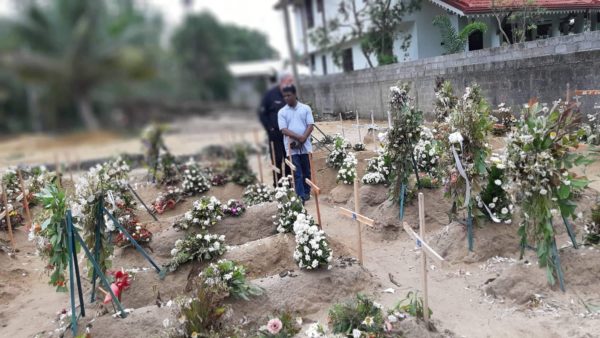
Kirk and Joseph walk among 42 freshly-dug graves of victims in Negombo.
From St. Anthony’s we travel north to the suburb of Negombo, to St. Sebastian’s Church. We are able to get closer than we had at St. Anthony’s. The sight of the bomb damage takes our breath away. Seeing the destruction, we are deeply moved to think of the Christians whose lives were snuffed out in one devastating instant. From the shattered church building we walk past large banners displaying the faces of those who died. We enter a nearby cemetery where we stand next to 42 freshly-dug graves, each marked by a simple wooden cross. They represent fewer than half of the 100+ lives lost on that Easter Sunday in Negombo. We stand there completely alone. It is a raw experience.
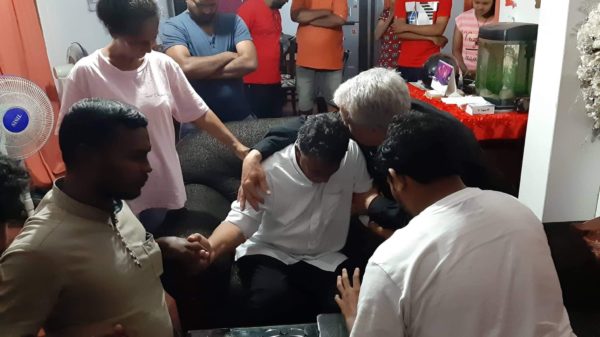
Comforting a father who lost his wife and daughter and whose two sons were injured in the bomb blast at Batticaloa.
From our somber visit to the cemetery we then go to nearby homes of those who lost loved ones. At the very first home we meet the father of a little boy who died in the bombing. His wife had lost her battle with cancer only two months earlier. There he stands next to a framed photo of his son. His hands are visibly trembling. We tell him we have come to be with him in his loss. He weeps openly. Nearby is the little boy’s best friend. Both boys had gone to Sunday school that Easter. One went to the front of the church; the other to get a snack. One lived; one died. The little boy’s eyes are filled with tears. Joseph reaches out and touches his face, tears streaking down his own cheeks as well.
At each home, we pray. We express as best as possible our encouragement; and at each one, we leave benevolence gifts. We sit and listen to the stories describing who these loved ones were. One man cries out, “Can you tell us why this has happened?”
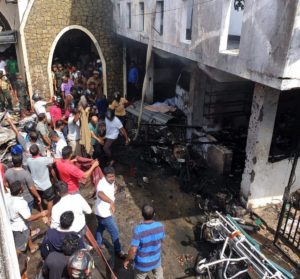
Rescue effort at Zion Church following the bombing.
By God’s providence, an opportunity opens for us to travel to the city of Batticaloa on the east coast of Sri Lanka, site of the final bomb blast. We are put in touch with Dr. Clements, a Christian physician who is also pastor of a small church on the outskirts of Batticaloa. He was there on Easter Sunday and had gone to the scene of the blast to render aid immediately after the attack. Dr. Clements meets us in Colombo and accompanies us on the arduous drive to the opposite coast. The trip takes eight hours on a rugged two-lane road. The journey is tense, punctuated with stops at numerous checkpoints.
Arriving in Batticaloa we go directly to a funeral. But first let me describe what happened in Batticaloa on that Easter morning. The terrorist had intended to unleash the fury of his bomb at St. Mary’s Church. However, as he approached the church, he realized that Mass was already over and the crowd was dispersing. He turned around and walked down the street to Zion Church, an Evangelical congregation. As he entered the church property he carried two large bags on his shoulders and he was taking a video with his phone. One of the church greeters stopped him and asked what he was doing. A Sunday school class had just let out nearby and the children were milling around waiting to go into the sanctuary. The greeter, a faithful Christian man who worked for the national railway, told the stranger that he could not go in. The terrorist then detonated his bomb. The massive explosion instantly killed 28 people, the majority of them children. The bomb was so strong that it shattered the church’s concrete floors and those of the parsonage next door. It also exploded the fuel tanks of several dozen motorbikes parked on the compound.
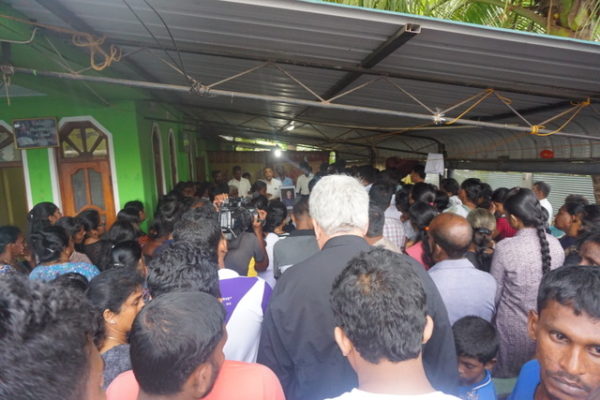
Funeral service of the railway man whose actions spared countless lives.
The funeral we are attending is that of the railway man. He is being remembered and honored as a hero. By stopping the bomber outside the church, he had undoubtedly prevented a far greater tragedy because the church facility was crammed with hundreds and hundreds of people that day. At the funeral—which is held at the man’s home—at least 1,000 mourners are gathered. The crowd fills an area stretching at least 100 yards from the house. As we approach we can hear a strong voice in the distance. No microphone, no sound system. I am literally pushed through the crowd to the end of the casket where I face the speaker directly. People are pushing me towards him but out of respect I stand firmly at the end, just to the right of the casket. The dead man’s wife, children and other family members are gripping the casket, weeping loudly. Someone whispers to me that the man officiating is the Senior Pastor of Zion Church. His face is so full of compassion, his voice speaking his native language with strength from the Lord. He communicates passion, hope, the Scriptures. He is himself overtaken by grief several times. I don’t know the language, but it is as if I understand every word. He is expressing the love and compassion of Jesus Himself. After a final prayer, men lift the casket overhead and begin to move toward the road. An unbelievably intense storm bursts at that very moment. The heavens open and the rain pours. And, if that is not enough, bolts of lightning begin to strike. Dozens of strikes. A tree not two yards away from us is split in two. Yet everyone walks on behind the casket. It is as if they are on a mission and will not stop for a storm or any other reason.
Departing from the funeral procession, we go to the nearby hospital. Dr. Clements accompanies us. We have no idea what awaits us there but I have witnessed mass tragedies of many kinds around the world. Each time it takes the inner strength of the Holy Spirit, a calm presence and words that must come only from God. After first being turned away, we pray, standing outside the hospital in the pouring rain. We try once again. Amazingly, we are not only let in but are gowned and guided to the critical care ward. The first patient we see is a 31-year-old woman whose chest has been pierced by ball bearings that were encased in the bomb. She is heavily sedated and fighting for her life. I lean over her and whisper a prayer of Christ’s love, healing, peace and comfort. In my heart I believe by faith she will live, that God will heal her. (The latest report is that she will survive.)

A little boy who lost his best friend struggles to understand.
Next we are led to the children’s floor. We all take a deep breath because we can smell the burns. I whisper a prayer, God give me your presence and the words to bring comfort and strength. We step into the ward. Bed after bed is occupied with little boys, most of them about 10 to 12 years old. We see a man sitting with his son. He asks us to walk with him to the hallway. He breaks down, gathers himself and says, “My wife and daughter were killed, and my two sons were wounded.” He looks at the son on the bed and says, “He doesn’t know.” His English is clear and distinct. I tell him that I have no words for him other than Scripture. I quote Psalm 23 to him as he trembles and faces the ground. We go back into the ward and pray with his son. A large cut across his face is stitched; one arm and one leg are fully bandaged. We touch him and express our love for him in Jesus’ name.
Next we come to a 10-year-old boy lying flat on his back. His entire body is bandaged. Only his pitiful little face is exposed. His arms are on the outside of the sheet, elevated and tightly bandaged all the way to his fingertips. He cries softly. His eyes are wide open, his head directed toward me at the foot of the bed. By his side is his mother, her sister, and another little boy in her arms. I introduce myself, telling them we are fellow Christians and we have come to be with them. I look to his mother and ask her son’s name and if I can have their permission to talk to him. She nods and says he speaks English. I move around to where he and I can be face to face. I will never forget his face and the fear in his little eyes. I am only inches away and I call him by name. I ask, “Ashaiel, can you hear me?” He nods his head. I think, this could be my son or grandson. I urge myself to stay calm and not become emotional, praying for God to give me the right words. I say to the boy, “You’re going to be okay. Jesus has told me to tell you that.” [As I write these words I still see him and weep as I think of him.] I tell him that God wants to use him greatly and has a great plan for his life. I then ask him, “Are you a tough little boy?” I’m not sure he understands but he nods a strong yes. I can still see how much pain he is in. Privately I grieve that he isn’t in a first world hospital. I ask him if I can pray for him and he nods again. I plead with God to take his pain away, to heal him from the top of his head to the bottom of his brown feet, to take away the bad memories. I tell him that Jesus loves him and that I will be praying for him. He is fighting the pain. He is showing remarkable strength.
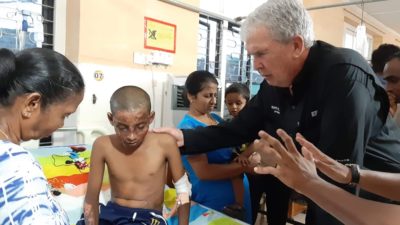
Praying with a young burn victim in Batticaloa.
In the next two beds the boys are sitting up, though their heads are badly burned. They are sedated but still very alert. The first boy has a strength, a presence that I just can’t explain. We talk and I am overcome by just being a dad and thinking of my boys. Only one father is present on the entire ward of boys. I ask this boy, “Do you like ice cream?” His burned face is already stiffening, already scarring, yet I can see the slightest smile as he nods yes. I ask him “what kind?” He says softly, “chocolate.” I put 5000 Sri Lankan rupees in his hand, equivalent to $28. I tell him that that is his personal ice cream money. The boy is saying something to me. Joseph speaks his language and tells me through his own tears, “He is saying he believes in prayer.” I gather my emotions and pray the same prayer I would pray for each boy—a prayer for healing, for the pain to be taken away, for awareness of God’s love and presence.
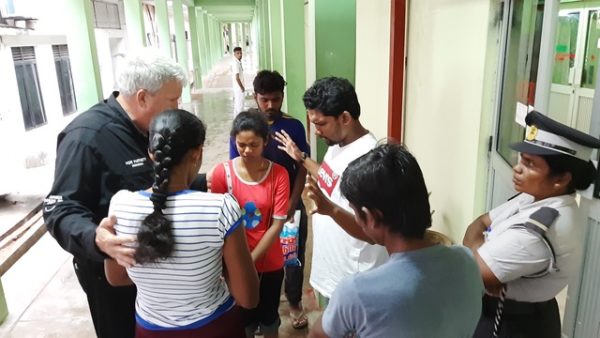
Praying with a family at the hospital in Batticaloa.
We continue to go from bed to bed, person to person. The very last one is a young man, only 25 years old. He has suffered severe burns over most of his body. His internal organs are damaged; his spleen has been removed. He gasps for breath. He has very little strength. There is nowhere for me to place my hand on him. I pause for a moment and wish desperately that Jesus Himself were here and able to physically touch the man and heal him completely.
After our time at the hospital we go to meet with the pastor of Zion Church, Roshan Mahesan, who presided at the funeral we attended earlier. He is a truly remarkable man. Pastor Mahesan tells us that he was at a speaking engagement in Norway of all places when the bombing devastated his church. He cancelled the rest of his itinerary and hurried back to Sri Lanka. He describes to us the amazing details of God’s protection on his wife, his adult children and his grandchildren, all of whom were at the church that fateful Easter Sunday. Each one was spared; but with great sadness he tells us that half of his pastoral team were killed, along with precious girls and boys.
We meet with Pastor Mahesan in his daughter’s home. His own home, built adjacent to the church building, is now uninhabitable. He says that the government has condemned the property—the entire church facility as well as his private residence. The bomb was so powerful that it lifted the structure off its foundation. Everything will be bulldozed to the ground and the church will have to start over from scratch. As he shares all the horrendous details his face is a picture of peace. He is grieved by the loss of so many lives, yet his confidence in God is unshaken. All of us feel we are privileged to sit and talk with a true man of God at a crossroads experience in his life and ministry. The Lord knits our hearts together over the next two hours.
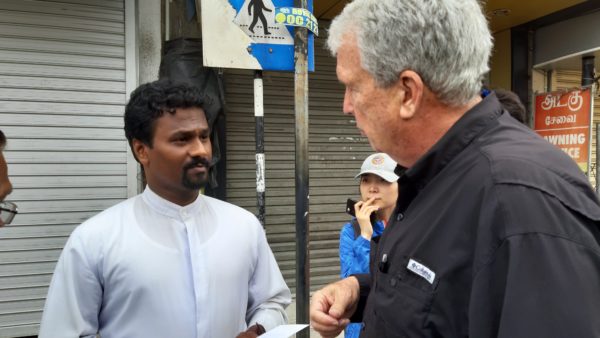
Firsthand report from Fr. Manoj Fernando, pastor of St. Anthony’s Church.
Early the following morning we depart Batticaloa and retrace the path of our eight-hour journey. This time there are even more checkpoints, an even tighter military presence. We are very aware of going through distinct districts. Dr. Clements tells us that these are ethnic “rings” that we’re passing through—some predominantly Muslim, some Buddhist, some Sikh, some Hindu. It’s as if we’re traversing zones in a spiritual war for the souls of Sri Lanka.
Back in Colombo for one final day, the priorities are clear in our hearts and minds: We will partner with Pastor Mahesan, helping him to rebuild his church and home, and we will also launch an effort with him to establish Hope Center Sri Lanka. There are children waiting to be rescued and transformed by the power of Christ.
A plan is taking shape. Please pray that God will give us clarity about the crucial next steps. And please ask Him, “What would you have me do, Lord?”
The apostle Paul said of his own ministry, “a great door for effective work has opened to me…” But then he added, “…there are many who oppose me.” We, too, have a great opportunity. But we, too, face great opposition. It must not deter us from doing the Lord’s will. We look to Him to empower us and to call His people—faithful friends like you—to join us shoulder to shoulder in this important work.
May God bless you as you follow His leading!
Kirk Nowery, for the entire Hope Partners team



